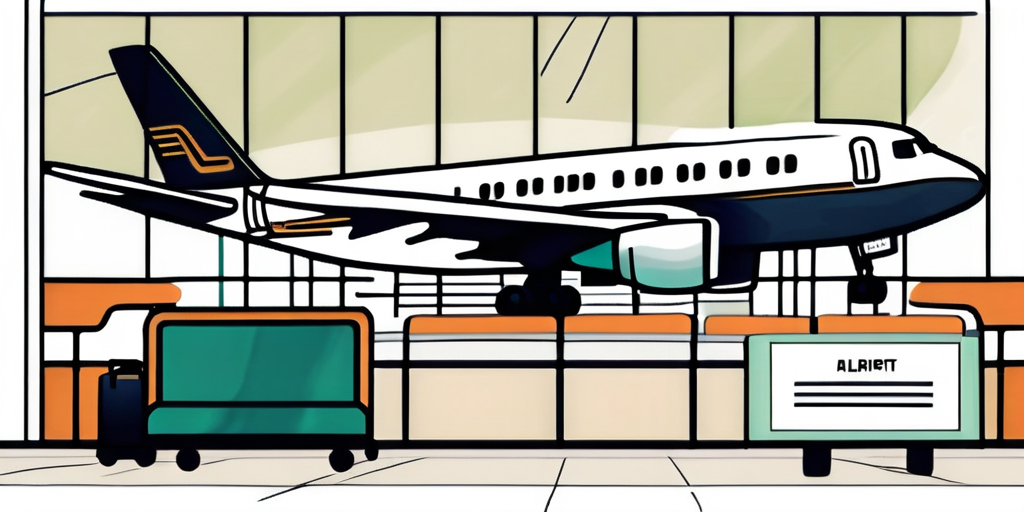How to Handle a Canceled Flight Email: Tips For Passengers
Unsure how to handle a flight cancellation email and compensation letter? Discover strategies for navigating travel changes with ease.
Flying can be an incredibly convenient and efficient mode of travel, but it is not without its challenges. One of the most frustrating and disruptive experiences a traveler can face is a canceled flight. Whether it's due to weather conditions, mechanical issues, or other unforeseen circumstances, flight cancellations can throw a wrench in even the most well-planned travel itineraries. In this article, we will explore [essential tips for managing the dreaded canceled flight email](https://www.claimcompass.eu/en/flight-cancellation-compensation/) and provide you with the information you need to navigate this stressful situation.
Understanding Flight Cancellations
Before diving into the practical aspects of handling a canceled flight, it's important to understand why flights get canceled in the first place. There are various reasons behind flight cancellations, ranging from severe weather conditions to operational issues. It's crucial to be aware of these factors to better comprehend the situation and manage your expectations accordingly.

Reasons Behind Flight Cancellations
Flight cancellations can occur due to a multitude of reasons. Inclement weather, such as thunderstorms, hurricanes, or heavy snowfall, can make it unsafe for planes to take off or land. Imagine a scenario where a powerful thunderstorm is brewing, with lightning flashing across the sky and strong winds gusting through the air. In such circumstances, pilots and air traffic controllers prioritize safety above all else, leading to the cancellation of flights. It's a necessary precaution to ensure the well-being of everyone involved.
Additionally, mechanical problems with the aircraft, such as engine failures or technical malfunctions, may necessitate the cancellation of a flight. Picture this: you're seated comfortably in the plane, ready for takeoff, when suddenly you hear a strange noise coming from the engine. The pilot, being vigilant and responsible, decides to abort the flight due to the potential risk. Although it may be frustrating for passengers, it's crucial to remember that the airline prioritizes safety above all else.
Other factors like air traffic congestion, strikes, and airport closures can also contribute to flight disruptions. Imagine a bustling airport during peak travel season, with planes coming and going at a rapid pace. Sometimes, due to unforeseen circumstances, the airport may become overwhelmed with traffic, leading to delays and cancellations. Similarly, strikes by airline staff or airport workers can disrupt flight operations, causing inconvenience for passengers. Additionally, airport closures due to security threats or natural disasters can result in the cancellation of flights. These factors, although beyond the control of both the passengers and the airlines, can have a significant impact on travel plans.
The Impact of Flight Cancellations on Travel Plans
A canceled flight can have a significant impact on your travel plans. Not only does it disrupt your immediate itinerary, but it can also cause a domino effect on connecting flights, hotel reservations, and other scheduled activities. Imagine this: you have meticulously planned a trip that involves multiple flights, hotel bookings, and sightseeing tours. Suddenly, your first flight gets canceled, throwing your entire itinerary into disarray. Not only do you have to rebook your flight, but you also have to rearrange all your other reservations, hoping to salvage what you can of your carefully planned trip.
Understanding the potential consequences of a flight cancellation will help you anticipate and prepare for the challenges ahead. It's essential to have a backup plan in place, such as travel insurance that covers flight disruptions or having alternative transportation options in mind. By being proactive and adaptable, you can navigate through the uncertainties that come with flight cancellations and minimize the impact on your travel plans.
Your Rights and Airline Responsibilities
As a passenger, it's important to be aware of your rights and the responsibilities of the airline in case of a flight cancellation. Familiarizing yourself with the legal frameworks and airline policies can empower you to make informed decisions and seek appropriate compensation or assistance when necessary.
 Flight cancellations can be frustrating and disruptive, but knowing your rights can help alleviate some of the stress. When faced with a canceled flight, passengers are entitled to certain rights and protections under the law. These rights may vary depending on the jurisdiction and the circumstances of the cancellation.
Flight cancellations can be frustrating and disruptive, but knowing your rights can help alleviate some of the stress. When faced with a canceled flight, passengers are entitled to certain rights and protections under the law. These rights may vary depending on the jurisdiction and the circumstances of the cancellation.
Legal Rights of Passengers in Case of Flight Cancellations
Generally, airlines are obliged to provide passengers with alternative transportation options, including rebooking on another flight or offering a refund for the unused ticket. However, it's important to note that these rights may not apply in cases of extraordinary circumstances, such as severe weather conditions or air traffic control restrictions.
Additionally, passengers might be eligible for compensation in cases where the cancellation was within the airline's control and not due to extraordinary circumstances. The amount of compensation can vary depending on the length of the flight and the delay caused by the cancellation. It's advisable to check the specific regulations in your jurisdiction to understand the compensation you may be entitled to.
Airline Policies for Canceled Flights
Aside from legal obligations, airlines often have their own policies and procedures in place to handle flight cancellations. These policies can vary among different carriers, so it's essential to familiarize yourself with the specific rules and guidelines of the airline you're flying with.
Some airlines might offer additional accommodations, such as hotel arrangements or meal vouchers, to passengers affected by flight cancellations. These provisions can greatly enhance your comfort and convenience during the disruption. However, it's important to note that not all airlines provide these additional services, and some may have more restrictive policies.
Being aware of these provisions will help you navigate the situation and make the most of the resources available to you. It's advisable to review the airline's policies before your trip and keep a copy of them handy in case of any unforeseen circumstances.
Remember, knowledge is power when it comes to understanding your rights and the responsibilities of the airline. By familiarizing yourself with the legal frameworks and airline policies, you can approach flight cancellations with confidence and ensure that you receive the assistance and compensation you are entitled to.
The Canceled Flight Email: What Does It Mean?
One of the primary ways airlines communicate a flight cancellation is through an email. Understanding the contents of the canceled flight email is critical in comprehending the implications of the cancellation and taking appropriate actions.
Deciphering the Canceled Flight Email
Upon receiving a canceled flight email, it's important to carefully read and interpret the information provided. The email may include details about the specific flight that has been canceled, the reason for the cancellation, and any alternative options or instructions. Take the time to analyze the email and ensure that you comprehend the relevant information before proceeding.
Important Information to Look for in the Email
When reviewing the canceled flight email, there are specific pieces of information that you should pay close attention to. These include the flight number, the date and time of the canceled flight, the alternative flight options offered by the airline, and any contact information for further assistance. Additionally, the email might contain details about compensation or reimbursement procedures, which can be useful in pursuing your entitlements.
Steps to Take After Receiving a Canceled Flight Email
Once you have processed the information provided in the canceled flight email, it's time to take action. There are several necessary steps you should follow to ensure that you handle the situation effectively and minimize the disruption to your travel plans.
Contacting the Airline: Best Practices
The first course of action after receiving a canceled flight email is to get in touch with the airline. It's essential to reach out to their customer service representatives as soon as possible to discuss your options and seek guidance. Keep in mind that during peak travel periods or widespread disruptions, hold times may be longer than usual, so patience is key. It's advisable to have your booking reference number and any relevant details on hand when contacting the airline to facilitate the process.
Seeking Compensation or Rebooking
Depending on the circumstances of the cancellation, you might be entitled to compensation or alternative flight arrangements. If the flight cancellation was due to the airline's fault or within their control, you can explore options for reimbursement or rebooking on another flight. Be proactive in communicating your preferences and requirements, but also remain open to possible compromises or alternative solutions offered by the airline.
Tips for Managing the Situation Effectively
Dealing with a canceled flight can be stressful and overwhelming. However, there are strategies you can employ to manage the situation effectively and ensure a smoother experience overall.

Keeping Calm and Staying Informed
It's natural to feel frustrated or anxious when faced with a canceled flight, but it's important to stay calm and composed. Panicking will not solve the problem and might hinder your ability to make rational decisions. Instead, focus on gathering information from reliable sources, such as airline representatives or official announcements, to stay informed about the latest updates and developments regarding your flight.
Utilizing Travel Insurance and Credit Card Protections
If you have travel insurance or purchased your flight using a credit card that offers protection, it's worth exploring the coverage and benefits available to you. Travel insurance policies often include provisions for trip interruption or cancellation, while certain credit card providers offer reimbursement for travel-related expenses in case of flight disruptions. Review your policy or contact your credit card issuer to determine if you qualify for any compensation or assistance.
While a canceled flight can be a major inconvenience, being prepared and informed can help you navigate the situation with greater ease. By understanding the reasons behind flight cancellations, familiarizing yourself with your rights and airline policies, deciphering the canceled flight email, and taking appropriate steps after receiving the notification, you can minimize the impact and effectively manage the challenges that arise. Remember to stay calm, communicate with the airline, and explore available options for compensation or rebooking. With these essential tips in mind, you'll be better equipped to handle a canceled flight and ensure a smoother journey.
Get the Compensation You Deserve with ClaimCompass
Flight cancellations can be more than just a temporary setback; they can also be an opportunity to claim the compensation you're entitled to. With ClaimCompass, you can effortlessly claim up to 600€ for flight disruptions. Our expertise in EU Regulation 261/2004 and our commitment to air passenger rights mean we handle everything for you—from submitting your claim to dealing with the airlines and even going to court if necessary. Don't let a canceled flight derail your plans without getting what you're owed. Check your eligibility for free with our compensation calculator and submit your claim today. Remember, there's no cost to you unless we succeed, and we're here to ensure you receive the compensation you deserve.
